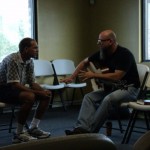An unhealthy emphasis on certain church gatherings?
As I’ve said several times, I believe that the church is God’s people gathered together. In the New Testament, the term translated “church” is never used to refer to a building, or an organization, or even a certain event/meeting.
But, since I think the term refers to God’s people gathered together (and not to us individually), then the term necessitates some type of “meeting” in the sense of two or more being together in the same place at the same time. However, and unfortunately, Christians often focus on one type of meeting or one specific meeting when they think about the church. This meeting is even given a special name, such as “the worship service.”
Over the last few days, I’ve had a short discussion on this topic on an older post with a reader named Greg. I thought that Greg’s points were too good to leave in the comments of that old post, so I’m going to copy them (and my responses) here:
Greg: I find it interesting and puzzling why there is so much emphasis on meetings today. I am much more interested in how we live our daily lives in our homes, at work recreationally and in community. Our daily regimen and lives together outside of meetings flow along without self conscious behavior and adherence to scripts then when it comes time to have a meeting we turn into wooden soldiers.
They have taken on an incredible amount of importance with serious discussion about how they should go and how often we should meet and who should be in charge and what we should do. But they reveal very let little about the real us, and even less about God. The disconnect between meetings and the lives of the believers is a serious concern to me. I suspect that’s why the scriptures don’t spill very much ink about meetings but are filled with the stuff of everyday life. if the church would like to see where they’re spirituality is let them fast from meetings for a year for all but the most important reasons to meet. I’m generalizing grossly here and covering all meetings with the same blanket and of course I don’t mean every meeting all the time everywhere. I am challenging the notion that meeting should be held simply because it’s time to have a meeting. if even a small percentage of the time that we collectively spend in meetings were redistributed and spent with one anothering.
Alan: I’m not puzzled at the emphasis on brothers and sisters meeting together. I am puzzled at the emphasis on certain types of meetings. I think it should be normal and natural for us to get together with other people who are following Jesus Christ. But, I don’t think it’s normal and natural for us to get together the way many church organizations dictate.
Greg: I guess I dont really know much about different kinds of meetings as I have only ever been with one group of people, though we went thru quite a metamorphosis from what might be called organic to self conscious.
Our meetings were not structured, and could morph into any one of several topics, go short or long and not happen again for days or weeks followed by one every day if the need arose.
Maybe it will help to explain my puzzlement by saying that I suspect that if we all had closer daily interaction, like family, meetings would not be such a big deal.
Alan: Those “closer daily interaction” meetings are exactly what we need.
When you think about gathering (meeting) with the church, do you think of a specific meeting or type of meeting, or do you think about any time you are with other brothers and sisters in Christ?
Guest Blogger: Man-made aspects of religion were coming back to haunt me
I’ve invited several people to write “guest blog posts” for this blog. There are several reasons for this: 1) To offer different perspectives. 2) To generate even more discussion and conversation between blogs. 3) To introduce other bloggers to my readers.
(If you are interested in writing a guest blog post, please contact me at aknox[at]sebts[dot]com.)
Today’s post was written by Surit Dasgupta. I think Surit is the first person from India to write a guest post for me. You can connect with Surit via his blog “Christ Our Lord.”
——————————————-
When I was twelve years old my dad brought me a very special gift on my birthday. It was a book called “Stories from the Bible – The New Testament”. I was fond of heroes, heroes who would triumph over evil against all odds, heroes who would protect the weak and the oppressed. I saw so many of these mythological characters in Hindu scriptures, there were warriors, lovers, and damsels in distresses. But when I finished reading about Jesus Christ I knew I had found the greatest Hero among all. I wanted to become a follower of Christ and there was nothing that was going to stop me from doing it.
As a Hindu, I was accustomed to rituals and clergy. The priest, better known as ‘pundit’ in Hinduism, would never allow a common man like me to touch the ‘deity’. I laughed at the pundit in my mind. I had a special secret – Jesus Christ. He was my guru and no one else. The rest were all man-made. Little did I know that these man-made aspects of religion were coming back to haunt me in my Christian life. I tried to find out what they were but I realized that they were all around me.
On Sunday meetings, the system in our local church was mechanized and very institutional. There was a ‘presider’ and he alone would determine who participate in the ‘service’. There was a preacher who would bring the ‘sermon’ which usually lasted 40-50 minutes. There was a strict almost classroom-like discipline which bounded the entire congregation. But there was something lacking and I knew it. The freedom to express Christ at will was non-existent. There were a couple of elderly members who were virtually sitting through the entire service (except that they had to ‘stand-up’ for the communion). These members had no-one to speak for them. There were disguised threats thrown by pulpit-armed preacher (I was a part of it) at members he didn’t like. No one dared say anything when the sermon was being delivered. And the most horrifying thing was that Christ was choke-holded into being a Spectator as well. It was Hinduism all over again!
It was at this point that someone gave me Frank Viola’s “Pagan Christianity?” to read. You can probably guess what happened afterward. I and a couple of other Christians protested against this mechanical institutionalism practiced by the local church leaders. We were ordered to ‘hush up’ and refrain from teaching our ‘false doctrine’. All we wanted was that everyone have the freedom to speak at will in the assembly.
One congregation considered our plea. There was an American missionary in that congregation and he wanted to hear us out. We moved to that congregation and were allowed to have an open-participatory meeting on Sunday. Everyone, except the missionary, was puzzled at what we were trying to achieve. Once that meeting began it all looked so very similar except that all of a sudden everyone had the freedom to choose their songs. There were people who said nothing in the usual Sunday ‘services’. These people were suddenly starting to ‘open’ their lips and say words of encouragement. People started to pray at random for one another. There was laughter… laughter at a Sunday meeting! It was surreal! It was so unlike an institutional church. It was like… like a family.
My mind now traces back to those first traces of Jesus in my childhood memory. He was the ultimate Hero – One who is the Protector of the weak and oppressed. Now He has a family – the church.
Replay: Meeting Around the Table of the Lord
Two years ago, I wrote a post called “Meeting Around the Table of the Lord.” The described our church gathering on Easter morning, when we gathered together “to break bread.” The Lord’s Supper was not a piece a bread and sip of juice tacked on the end of our meeting. Instead, our meeting was centered on sharing a meal together.
Here is the post:
——————————————
Meeting Around the Table of the Lord
I’ve written several times on this blog about the Lord’s Supper, or Communion, or the Eucharist, or whatever you want to call it. I’ve talked about how the Lord’s Supper is described as a meal in Scripture. I’ve also written about how we usually eat together when we gather with the church.
Still, though, there has usually been a disconnect between our meeting together, the bread/cup, and eating a meal together. I’ve often thought about how this disconnect could be remedied.
Last Sunday – yes, Easter Sunday – we had an opportunity to meet in a different way that brought together the bread/cup, a meal, and our whole meeting.
We began by meeting around tables. People knew that we would be eating together, so they brought food with them – rows of crock-pots, casseroles, dishes, and other assorted goodies. We then milled around and talked and discussed our week and different things like that.
Eventually, one of our brothers started leading us in some singing. Since it was Easter, and since we were planning to study the resurrection passage in Matthew 28:1-17, we sang several songs about the resurrection. We’re also reading through Acts together, so at one point two brothers read from Acts 18, one reading the first half of the chapter, and another reading the second half of the chapter.
After a few songs, we talked about the significance of the bread and breaking the bread. We talked about how the bread signified both Jesus’ broken body as a sacrifice on our behalf, and how the broken bread signifies the beginning of our meal with Jesus as our risen, living host. It remains his table, not ours.
Since I was planning to lead our discussion of Matthew 28:1-17 that morning, I suggested several questions that people could discuss together around their tables as they were eating.
Then, after we broke and shared the loaf of bread together, we began eating. As we ate, we discussed the questions that I suggested. After most people had finished eating, and while a few were finishing dessert, I asked each table (we had five tables) to share something about their discussion.
Next, I read and led a discussion of Matthew 28:1-17. Of course, our discussion around the table led into this teaching/discussion. Since people had already been talking about the issues in smaller groups, it seemed our larger group discussion was even more open and focused on the topic.
Finally, after a few announcements, we passed around the “cup” (actually a bottle of grape juice) and shared this together.
There are many ways for the church to meet together. I really appreciated the way we met together last Sunday. I liked the way that our meeting format combined the bread, cup, meal, and teaching all together in a unified format. The bread/cup and meal were not “tacked on” to the meeting, but were an integral part of our meeting together.
The Conditional Church
In my previous post – “Jesus, you forgot the conditional statements again” – I pointed out (in my sarcastic manner) that many (perhaps most?) of Jesus’ commands are offered with no conditional statements. So, for instance, when Jesus says, “Give to those who beg of you,” he did not tell his listeners to consider how they would use the gift before it is given. Although, of course, we often add our own conditional statements…
But, we don’t just add our own conditional statements to Jesus’ commands. We add conditional statements to commands concerning the church and descriptions of the church also. Interestingly, the conditional statements help form what we read in Scripture to what we already do or believe today. (Quite convenient, actually.)
For example, read through the following commands and/or descriptions and ask yourself this question: What “conditional statements” do I assume that author meant even though he didn’t include the condition when he wrote?
Let the word of Christ dwell in you richly, teaching and admonishing one another in all wisdom, singing psalms and hymns and spiritual songs, with thankfulness in your hearts to God. (Colossians 3:16 ESV)
And we urge you, brothers, admonish the idle, encourage the fainthearted, help the weak, be patient with them all. (1 Thessalonians 5:14 ESV)
And let us consider how to stir up one another to love and good works, not neglecting to meet together, as is the habit of some, but encouraging one another, and all the more as you see the day drawing near. (Hebrews 10:24-25 ESV)
What then, brothers? When you come together, each one has a hymn, a lesson, a revelation, a tongue, or an interpretation. Let all things be done for building up. (1 Corinthians 14:26 ESV)
Let each of you look not only to his own interests, but also to the interests of others. (Philippians 2:4 ESV)
Surely there are many other passages that I could list. These passages above deal with gathering together and interacting with one another. How many conditional statements to we place on these commands and descriptions?
What kinds of conditional statements? Well, statements such ask these: “… if the leaders/elders/pastors permit it…”, “… if the size of the group gathering is not too large…”, “… if the person understand enough orthodox theology…”, “… if… if… if”.
We are good at adding conditions, especially when it comes to the church.
The Church without the Holy Spirit?
Dan at “Cerulean Sanctum” has been writing some very good posts lately. His latest is no exception: “The Spirit-Led Church Is the Only Real Church.”
It seems like Dan makes two points in this post. First, he’s saying that it’s possible to do certain activities without the involvement of the Holy Spirit. Second, he’s saying that a “real church” (as demonstrated in Scriptures) cannot operate without the Holy Spirit.
For the first point, Dan says:
We can sing songs without the Holy Spirit.
We can recite lines of liturgy without the Holy Spirit.
We can talk with others about life without the Holy Spirit.
We can prepare sermons without the Holy Spirit.
We can listen to those Spirit-less sermons without the Holy Spirit.
We can offer prayers without the Holy Spirit.
We can partake of a thimble of grape juice and a tiny cracker without the Holy Spirit.
We can run through our optimized order of service without the Holy Spirit.
As to the second point, Dan says:
The church assembly of the Bible was led by the Spirit from beginning to end. It depended in the Spirit for everything. Without the Holy Spirit, the charismatic gifts would cease to function. There would be no prophetic words possible. No words of knowledge or wisdom. No healing. None of the functions of a normal assembly of Christian people filled by the Spirit coming together to share their individual giftings in a public setting.
The order of the church would vanish without the Holy Spirit. What would those assembled do next? No one would have a psalm or spiritual song to bring because the Holy Spirit would not be there to inspire its singing or bringing. What inspired-in-the-moment message would be possible? Who would lead?
The people in the church assembly, those equipped by the Spirit to use their gifts, would have nothing to do, their reliance on the Spirit shattered by His absence. They would sit passively, lost.
A real church without the presence of the Holy Spirit to guide, equip, use, and mobilize would cease completely to be what it is supposed to be as depicted in the Bible.
Interestingly, the Holy Spirit often leads us to do certain activities that can be done without him or apart from him. So, how can we tell the difference between doing certain activities WITHOUT the Holy Spirit and doing them WITH the Holy Spirit?
Different forms of participation
Michael at “2nd man united” is writing a series of posts called “What it means to be organic.” His third post in the series is “Moving Participation From Positions to People.”
In this series, Michael is comparing “mechanical order” to “organic order.” I think this is a helpful comparison, although certainly some will disagree with it. However, it is helpful when we see the differences in the topic being discussed.
For example, all believers think that participation is a good thing. But, often, we are talking about different things when we talk about “participation.” Michael writes:
In mechanical order, people are invited to participate by filling in positions in a master plan. For example, setting up ministry programs and asking for volunteers to serve in the ministries. In this case, leaders invite people to participate in ways that serve the plan. They are then inserted into the manufacturing process (program) with the intention that they are a piece that can help bring about the predetermined desired outcome…
In organic order, individuals are invited to participate as themselves for the good of the group as a whole. The mission (or ministry) emerges from how the individual participants grow together as a community and interact with the world around them given their competencies (spiritual gifts, natural talents, etc.). To be truly organic, community must take precedence above mission. This is the only way that the priority of the health of the individuals is kept front and center. If mission comes first, you sacrifice the health of the individuals for what they can do for the mission. Instead, the mission comes out of the improved health of the individuals. Plus, God’s eternal purpose is wrapped up in community. Community is the prime product. Mission is a by-product. (emphasis in original)
The difference, as Michael points out, is the form of participation. Are people required to participate with one another in set forms or methods that have been already set up as part of a plan? Or, are they free to participate as they are – that is, as God has gifted and prepared them?
Yes, in the “organic” form of participation, there is an increased likelihood of messiness. In the “mechanical” form of participation, things flow more smoothly.
Of course, I’m not convinced that “more smoothly” is better than “messier,” but that would probably be a good topic for another day.
Don’t misunderstand me… God can and does work through both mechanical participation and organic participation. However, I believe that organic participation is healthier for the church.
How have you seen God work through both mechanical and organic participation? Which form do you think is healthier for the church? Why?
Why should we let THAT PERSON speak to the church?
In my previous post, “I did NOT expect God to do THAT,” I reflected back on our study of Hannah’s prayer in 1 Samuel 2. As I said, her prayer indicates that God often works through ways and people that we do not expect. It reminded me of something Paul wrote in 1 Corinthians 1:26-29.
Both of these passages remind us that often God does not work in the ways that we expect, and often God does not work through the people that we might expect.
But, how should this reminder (and pattern that we find throughout Scripture) affect the way that we gather together as the church?
Who do you expect God to use when the church gathers together? Through whom do you expect God to speak and exhort his church when you gather together? Before you answer, think about how you gather with the church. How does your pattern and methods of gathering together indicate your answers to those questions?
For most churches, the answers are apparent. When the church gathers together, we expect that God will use and speak through certain leaders, but not through others. These are our expectations, and those expectations are readily indicated by the way that we meet together and especially by who is allowed to speak and the prominence that is given to that particular time of speaking (i.e., the sermon).
But, what if – as the passages above and many other passages indicate – God truly does desire to work through and speak through “unexpected” ways and through “unexpected” people?
I’ve witnessed this time and time again as we meet together as the church. As different people speak and exhort and teach and admonish, God often chooses to speak through the most unexpected person or through an unexpected illustration or example. A child? Yep. A new believer? Yes. A woman? uh huh. Even an unbeliever?
Would God really speak to his church through an unbeliever? Wow… that would be totally unexpected.
Of course, for many Christians, the assumption would be that I’m talking about a child, or a new believer, or a woman, or an unbeliever delivering a 30-45 minute sermon. That’s not the case. God does not need a sermon or 30-45 minutes or a seminary-trained professional or a pastor/elder to speak to his children.
However, he does want his children to be willing to listen to others… to be open to him working through and speaking through unexpected channels.
When Paul is instructing the church in Corinth about speaking and serving when the church gathers (1 Corinthians 14), he gives a few guidelines, such as doing so in love and for the purpose of building up the church. But, throughout that chapter, it’s clear that he expects God to work through many of the people gathered together.
What are our expectations when we gather with the church? Do we expect God to work through one or two, or through any who gather with us? Do we expect God to work through us?
The way that we answer those questions will affect that way that we gather with other believers. And, the way that we gather with other believers indicates how we truly answer those questions.
Guest Blogger: Simple Church (TM)
Last year, I invited several people to write “guest blog posts” for this blog. There are several reasons for this: 1) To offer different perspectives. 2) To generate even more discussion and conversation between blogs. 3) To introduce other bloggers to my readers.
(While I may continue to invite people to write guest posts, I would be willing to publish *almost* any post related to the church. If you are interested in writing a guest blog post, please contact me at aknox[at]sebts[dot]com.)
Today’s post was written by Joe (JR) Miller. J.R. Miller is a former church planter and now professor living in San Diego, California with his wife and three sons. He is an author and avid blogger. You can reach him at either www.MoreThanCake.org or www.EmergingLife.org.
————————————
“Simple Church ™”
Inspired by my friend Alan’s post “Just Make Disciples ™“, I am convinced that church is meant to be simple. All the institutional stuff has really hurt our Faith. Here is my new motto:
Church–So Simple That Anyone Who Follows Me Can Do It!
Why do we hold men above Christ?
Seminary trained pastors set themselves up as experts by writing books that teach us all kind of pagan things about leadership and community when all we truly need is the Bible. I am so convinced that the Bible is ALL we need, that I am commissioning a team of writers with no seminary training and who have never lead anything to write a book that everyone should read. This team of experts (with names you are sure to recognize) well give everyone all they need to know about how not to be a leader and how to avoid training so you can start a Simple Church. Oh, and we will have a magazine too!!
Why do we need all those conferences for “professional” clergy?
Those conferences are corrupting the church and taking away the priesthood of all believers. To counter this spiritual-tragedy, I would like to invite everyone to a new conference starting next year. The conference will be titled, “No More Conferences“. We will feature worship bands (unprofessionally led of course) and lecturers who will teach us how sermons are bad because they feature just one guy talking with everyone in chairs facing forward. Our conference will be held in a theatre where everyone will have nice chairs facing the stage so they can enjoy our featured experts. Come to the conference and you will get trained by our totally uneducated and fully untrained experts on how to be a Simple Church leader.
Why do we make paid preaching/teaching the center of our faith?
I think it is terrible that we listen to sermons and download them and sell them when the Gospel should be free. If you want to learn more, check back tomorrow and I will have a recorded talk you can download for a small fee or you can always order the CD. The Apostle Paul never sold his letters to the church and next year I will also have a new copyrighted book out on Amazon that will tell you all about it for just $9.99. These teachings will explain how we are destroying the church by trusting preachers who sell stuff all the time. (BTW, since I am not a paid preacher, I am allowed by the New Testament to sell this stuff… besides, my motives are pure unlike those other guys.)
Why have we made it so difficult to be the Spirit-led Church?
Men have put themselves out as leaders and make us think that unless we read what they write, we cannot be a valid church. That is just not how God works. So I am announcing the launch of a new blog that will feature all my books and all my recorded messages from conferences and weekly posts. My site will teach you how not to follow after the teachings of men. Trust only the Holy Spirit and follow me.
Why do we follow denominations?
Simple church will be all about rejecting denominations and seeing everyone as our brother and sister in Christ. To help you figure out which churches are truly simple, and not heretical like those institutional ones, we will set up a network of Simple Churches. We will have memberships and everything and promote our approved network of churches from our website.
Why do we meet in big buildings?
Anyone who reads the New Testament, or church history, knows that aside from meeting in public buildings or in Synagogues or caves, the church only ever met in homes. If your church is meeting anywhere but a house, you are corrupting God’s simple church because the house is God’s designated place for church meetings. A house is the only place that does not restrict the moving of the Spirit and A house is the only place where people won’t get corrupted by all the bad stuff. (You will learn more about this at next years’ big conference)
Church is Simple and anyone can do it!! So keep reading. listening, conferencing, networking, meeting in homes and downloading my stuff and I will teach you all the things you need to know about how to keep church simple and avoid the institution.
Oh, and don’t forget, if you don’t read all my stuff and listen to all my messages and go to my conferences, you will never know what stuff is forbidden by the New Testament and you will never be free from all the institutional stuff that holds you back.
Replay: Spiritual gifts and the gathered church
Five years ago, I wrote a post called “Spiritual Gifts and the Gathered Church.” God gifts all his children in ways that he can work through them to build up others. Think about that a moment: “to build up others.” That assumes that God’s children are given opportunities to speak to and serve others when they are gathered together.
It seems simple and straightforward, but it’s a “radical” idea among the church today. I think that’s very unfortunate, and I think that the church is hindered in their growth because of it.
————————————
“Spiritual Gifts and the Gathered Church”
One of the most interesting books that I have read in the last few years is Paul’s Idea of Community (Peabody, MA: Hendrickson Publishers, 1994) by Robert Banks. In one part of this book, Banks discusses the purpose of Spiritual gifts for believers, especially when believers are gathered together:
We have seen how gifts were distributed to every member of the community by the Spirit and that through their mutual sharing these were exercised amongst them. Guidance on matters affecting the community’s life was principally granted to members when they met together to discern what God required of them. They received this guidance from the Spirit through their exercise of gifts of knowledge, revelation, wisdom, and so on. In all this Paul never tires of insisting that every member of the community has the responsibility to impart the particular insights they have been given…
Thus, the most characteristic setting in which the community received guidance was when Christians assembled to share and evaluate the gifts given to them. Here, in a variety of complementary ways, the guidance was conveyed through each to all and through all to each.
Both nurture and discipline within the congregation, then, should arise spontaneously from the concern of every member for the quality of its life and the involvement of every member in decisions affecting the whole. (137-138)
Banks describes exactly what Paul writes about in 1 Cor. 12:7: Spiritual gifts are given for the benefit of others, not for our own benefit. Perhaps, Acts 13 includes the best biblical example of the Spirit communicating to the community through the gifts of those within the community:
Now there were in the church at Antioch prophets and teachers, Barnabas, Simeon who was called Niger, Lucius of Cyrene, Manaen a member of the court of Herod the tetrarch, and Saul. While they were worshiping the Lord and fasting, the Holy Spirit said, “Set apart for me Barnabas and Saul for the work to which I have called them.” Then after fasting and praying they laid their hands on them and sent them off. So, being sent out by the Holy Spirit, they went down to Seleucia, and from there they sailed to Cyprus. (Acts 13:1-4 ESV)
Notice that it was in the context of exercising spiritual gifts (i.e. to the benefit of other people – 1 Cor. 12:7) that the men were serving the Lord. (Now, I know that the ESV says the men were “worshiping”, but the word is probably better translated “serving”.) While they were serving people and the Lord, the Spirit communicated both to the men being sent, and also to the church. The men listened, and the church listened. The Spirit spoke. The people responded. Interesting, this passage says that both the church “sent” the men and that also the Spirit “sent” the men.
Scripture only gives two requirements for someone to exercise their gift when the church is assembled: whatever they do must be motivated by love (1 Cor. 13) and must edify the church (1 Cor. 14:26). No gifts should be refused, and no gifts should be elevated above the others – as long as the gifts are used to edify other people. Similarly, the people should be given the opportunity to use their gifts when the church is assembled, and they should be reminded that God holds them responsible for this. In other words, if someone is in charge of the meeting time, that person should make sure that others are given opportunity to edify the church. And, the people gathered should be reminded that God wants them to participate and expects them to participate in building up the body.
Do you expect God to communicate to you through the Spiritual gifts of the entire body, or just through the gifts of a few leaders within the body? Do you expect God to communicate to the church through the Spiritual gifts that he gives you? Are you obedient to God in building up his church and allowing others (with different gifts perhaps) to have the same opportunity?
When the church gathering is not dependent on a robust spiritual life operating in all its members
Like many others, I encourage “every member ministry.” Of course, this looks different to different people, and it should look different in different contexts. But, there are similarities, such as the opportunity for everyone to talk part (speaking and serving) when the church gathers together.
Josh at “Called to Rebuild” is talking about this in his latest post “Are our gatherings truly an expression of the church which is His Body?”
I think that Josh expresses this view of “every member ministry” very well, and better than I have in the past. For example, at one point he says:
Most of the gatherings you’ll ever walk into would be entirely unaffected should you continue to show up week after week and never participate in the meetings or community life. Ironically, though it is designed for you (and for the other people present) the show would go on with or without you just the same. It is not dependent on a robust spiritual life operating in all its members resulting in a healthy, moment-by-moment functioning of the Body as a whole. Rather, it is carried on mostly by a select number of staff members aided by the volunteer labor of a few eager laymen.
Think about it… if “the show would go on” exactly the same whether you were there or not, then are you truly part of that church gathering? Not really. You’re more like a person watching a movie at the theater than someone taking part in the gathering of the church.
But, what a difference it makes when every follower of Jesus Christ is given the opportunity to let the life of Christ flow through them and into the others gathered together!









